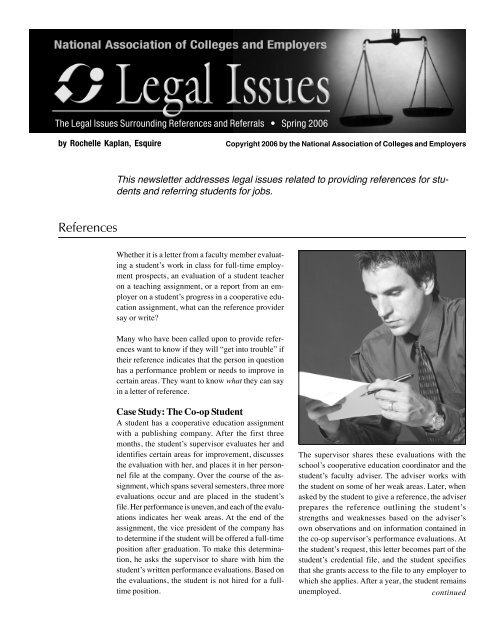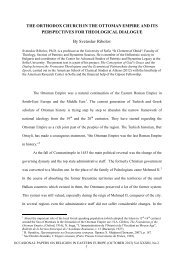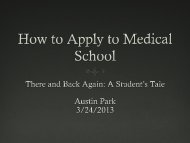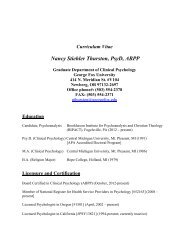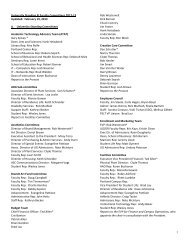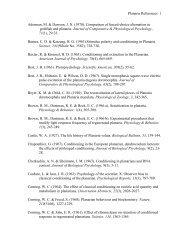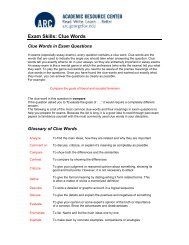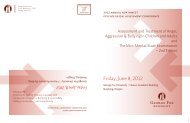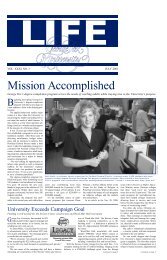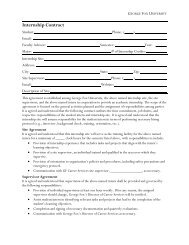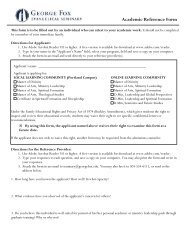References - National Association of Colleges and Employers
References - National Association of Colleges and Employers
References - National Association of Colleges and Employers
Create successful ePaper yourself
Turn your PDF publications into a flip-book with our unique Google optimized e-Paper software.
The Legal Issues Surrounding <strong>References</strong> <strong>and</strong> Referrals • Spring 2006<br />
by Rochelle Kaplan, Esquire<br />
Copyright 2006 by the <strong>National</strong> <strong>Association</strong> <strong>of</strong> <strong>Colleges</strong> <strong>and</strong> <strong>Employers</strong><br />
This newsletter addresses legal issues related to providing references for students<br />
<strong>and</strong> referring students for jobs.<br />
<strong>References</strong><br />
Whether it is a letter from a faculty member evaluating<br />
a student’s work in class for full-time employment<br />
prospects, an evaluation <strong>of</strong> a student teacher<br />
on a teaching assignment, or a report from an employer<br />
on a student’s progress in a cooperative education<br />
assignment, what can the reference provider<br />
say or write?<br />
Many who have been called upon to provide references<br />
want to know if they will “get into trouble” if<br />
their reference indicates that the person in question<br />
has a performance problem or needs to improve in<br />
certain areas. They want to know what they can say<br />
in a letter <strong>of</strong> reference.<br />
Case Study: The Co-op Student<br />
A student has a cooperative education assignment<br />
with a publishing company. After the first three<br />
months, the student’s supervisor evaluates her <strong>and</strong><br />
identifies certain areas for improvement, discusses<br />
the evaluation with her, <strong>and</strong> places it in her personnel<br />
file at the company. Over the course <strong>of</strong> the assignment,<br />
which spans several semesters, three more<br />
evaluations occur <strong>and</strong> are placed in the student’s<br />
file. Her performance is uneven, <strong>and</strong> each <strong>of</strong> the evaluations<br />
indicates her weak areas. At the end <strong>of</strong> the<br />
assignment, the vice president <strong>of</strong> the company has<br />
to determine if the student will be <strong>of</strong>fered a full-time<br />
position after graduation. To make this determination,<br />
he asks the supervisor to share with him the<br />
student’s written performance evaluations. Based on<br />
the evaluations, the student is not hired for a fulltime<br />
position.<br />
The supervisor shares these evaluations with the<br />
school’s cooperative education coordinator <strong>and</strong> the<br />
student’s faculty adviser. The adviser works with<br />
the student on some <strong>of</strong> her weak areas. Later, when<br />
asked by the student to give a reference, the adviser<br />
prepares the reference outlining the student’s<br />
strengths <strong>and</strong> weaknesses based on the adviser’s<br />
own observations <strong>and</strong> on information contained in<br />
the co-op supervisor’s performance evaluations. At<br />
the student’s request, this letter becomes part <strong>of</strong> the<br />
student’s credential file, <strong>and</strong> the student specifies<br />
that she grants access to the file to any employer to<br />
which she applies. After a year, the student remains<br />
unemployed.<br />
continued<br />
<strong>National</strong> <strong>Association</strong> <strong>of</strong> <strong>Colleges</strong> <strong>and</strong> <strong>Employers</strong><br />
www.naceweb.org/1
In this scenario, defamation <strong>and</strong> qualified privilege<br />
are the key issues involved.<br />
Defamation: To be defamatory, a statement must be<br />
false <strong>and</strong> must harm the person’s reputation <strong>and</strong><br />
lower him or her in the esteem <strong>of</strong> the community.<br />
“Harm to one’s reputation” must result in some tangible<br />
harm to the person, e.g. loss <strong>of</strong> money, business,<br />
or employment. A substantially true statement<br />
may be defamatory if it is incomplete <strong>and</strong> misleading.<br />
Statements <strong>of</strong> pure opinion are defamatory if they<br />
are based on unsubstantiated facts.<br />
privilege are met, the communicator has a complete<br />
defense against the defamation claim. A qualified privilege<br />
to the communication exists as long as the<br />
speaker makes the communication in good faith <strong>and</strong><br />
has a public or private duty, or legal, moral, or social<br />
obligation to do so, <strong>and</strong> as long as the person receiving<br />
the information has a corresponding duty or interest<br />
in the communication. Some courts have held<br />
that qualified privilege applies to personnel evaluation<br />
information or intracompany communications<br />
regarding an employee’s fitness.<br />
A statement loses its privileged character if the communicator<br />
is motivated by ill-will, demonstrates excessive<br />
communication <strong>of</strong> the statement, or makes it<br />
without grounds for believing it to be true. The issue<br />
is not only the factual accuracy <strong>of</strong> the statement; an<br />
employee must also show that substantial evidence<br />
exists that the supervisor made his or her statements<br />
without believing them to be true or lacked grounds<br />
for belief in the truth <strong>of</strong> the statements. Reckless<br />
disregard for the truth includes a failure to verify in<br />
circumstances where verification is practical.<br />
An employer may be protected by a qualified privilege<br />
concerning an employee when disclosing information<br />
is necessary to serve the employer’s legitimate<br />
interest in an employee’s fitness to perform. For<br />
example, qualified privilege applies when a current<br />
employer discloses the reason for an employee’s discharge<br />
to a prospective employer, <strong>and</strong> when a supervisor<br />
is informed <strong>of</strong> his/her employee’s improper conduct.<br />
The privilege may be lost if the defamatory<br />
communication reaches people who do not have a<br />
legitimate interest in the subject.<br />
The general rule is that no defamation is committed<br />
unless the statement is written or spoken to someone<br />
other than the person about whom the statement<br />
is made. This can be a communication within a<br />
company or institution, or a communication outside<br />
<strong>of</strong> an organization. Some courts have held that if the<br />
communication is among managerial personnel <strong>of</strong> the<br />
same organization <strong>and</strong> concerns business issues such<br />
as performance problems <strong>of</strong> employees, it is not a<br />
publication to a third person.<br />
Qualified privilege: Additionally, in the employment<br />
context, the law provides a “qualified privilege” for<br />
making defamatory remarks. That is, while the remarks<br />
may still be untrue, if the conditions <strong>of</strong> the<br />
How does qualified privilege apply to the co-op<br />
student’s situation? The first communication is made<br />
in the performance evaluations, which are sent from<br />
the supervisor to the vice president <strong>of</strong> the division<br />
so he can make a hiring decision. This is an intracompany<br />
communication given to an individual in<br />
the company who has a legitimate interest in the information.<br />
Unless the student can show that there<br />
was ill-will underlying the evaluations—for instance,<br />
that the supervisor had an axe to grind with the student—this<br />
communication is qualified. Had the supervisor<br />
sent these performance evaluations to others<br />
in the company who did not request the information<br />
or who had no reason to obtain the information,<br />
qualified privilege would be lost due to excessive<br />
publication. If the supervisor made inaccurate state-<br />
2/<strong>National</strong> <strong>Association</strong> <strong>of</strong> <strong>Colleges</strong> <strong>and</strong> <strong>Employers</strong><br />
www.naceweb.org
ments, <strong>and</strong> verification for accuracy was practical, then<br />
qualified privilege would also be lost.<br />
The second communication, from the supervisor to the<br />
faculty adviser, was made outside <strong>of</strong> the company <strong>and</strong><br />
outside <strong>of</strong> the employment context. Did the adviser have<br />
a good-faith reason to know this information? If the<br />
cooperative education arrangement between the school<br />
<strong>and</strong> the employer specifically states that reports will be<br />
made to the school regarding the student’s progress,<br />
then the adviser has a contractual right to this information.<br />
It is not clear under the law whether the adviser<br />
should be receiving these reports if there is no agreement<br />
for him to do so. One could argue that there is an<br />
educational need to know; that is, the adviser needs to<br />
have this information to work with the student on her<br />
weak areas. It is also wise to advise the student prior to<br />
the commencement <strong>of</strong> the employment experience that<br />
such a communication between the supervisor <strong>and</strong> the<br />
faculty adviser will occur.<br />
The third communication is the reference letter from<br />
the adviser to other employers. Like performance<br />
evaluations, reference letters are used as part <strong>of</strong> the<br />
selection process for hiring decisions. It is not clear<br />
whether an adviser’s reference to a prospective employer<br />
would be given the same qualified privilege as<br />
a prior employer’s communication to a prospective<br />
employer. 1 However, an argument could be made that<br />
the adviser is merely providing relevant job-related<br />
information to an employer as part <strong>of</strong> the hiring process,<br />
<strong>and</strong> thus, the reference should be viewed under<br />
the qualified privilege test.<br />
Regardless <strong>of</strong> whether the reference meets the tests<br />
used to assess the legality <strong>of</strong> a reference (st<strong>and</strong>ard<br />
defamation or qualified privilege), what matters in this<br />
case is that the reference was communicated to other<br />
individuals who had a good-faith need to know—in<br />
this case, prospective employers. In fact, the student<br />
controlled who would receive the letter by placing it in<br />
her credential file <strong>and</strong> specifying who could obtain the<br />
contents <strong>of</strong> the file: She could designate that access<br />
was to be given to specific employers or give blanket<br />
consent <strong>and</strong> open the file to any employers interested<br />
in her. It would be different if the adviser sent the letter<br />
to any employer or sent the information indiscriminately<br />
to anyone who requested it. The flaw in the reference,<br />
however, is the use <strong>of</strong> the supervisor’s performance<br />
evaluations as part <strong>of</strong> the letter. The adviser did not<br />
collect this information, nor did he make an attempt to<br />
verify its accuracy. Once again, it is not at all clear<br />
whether this alone would result in the adviser being<br />
held liable for defamation since we don’t know what<br />
was said in the letter <strong>and</strong> whether the student’s failure<br />
to gain employment can be directly related to the contents<br />
<strong>of</strong> the reference letter. Certainly, if reference letters<br />
are based upon another individual’s observations,<br />
the reference writer should have documentation <strong>of</strong><br />
these observations <strong>and</strong> accurately describe them in<br />
the reference.<br />
Reference Immunity Laws<br />
Thirty-nine states <strong>and</strong> jurisdictions have passed reference<br />
immunity legislation, which essentially provides<br />
protection from civil lawsuits against employers who<br />
provide references for former employees. 2 Individuals<br />
other than employers who provide references are not<br />
protected under these laws <strong>and</strong> must rely on the common<br />
law defenses—truth or qualified privilege—<br />
against charges <strong>of</strong> defamation. This means that faculty<br />
members, student advisers, or other school personnel<br />
who provide students with references would not be<br />
protected by the law, unless the student was an employee<br />
<strong>of</strong> the school. In the above scenario, the supervisor<br />
would have protection under the immunity laws,<br />
but the faculty adviser would not.<br />
To be sure, evaluations <strong>of</strong> an individual’s performance,<br />
whether at work or in the classroom, are an<br />
integral part <strong>of</strong> the world <strong>of</strong> work <strong>and</strong> education. Information<br />
contained in the letter must be based upon<br />
facts that can be documented in the person’s employment<br />
or student records. Besides this simple rule <strong>of</strong><br />
thumb, those providing references should be aware<br />
<strong>National</strong> <strong>Association</strong> <strong>of</strong> <strong>Colleges</strong> <strong>and</strong> <strong>Employers</strong><br />
www.naceweb.org/3
<strong>of</strong> certain limitations on what should be communicated<br />
in a reference letter (i.e., limitations arising<br />
out <strong>of</strong> discrimination law, FERPA, <strong>and</strong> case law on<br />
intentional misrepresentation liability), even if the<br />
information is truthful.<br />
Intentional Misrepresentation Liability<br />
Reference writers sometimes overcompensate <strong>and</strong><br />
provide a glowing reference, when in fact the student<br />
may have done something wrong or been a<br />
problem performer. In most cases, when a reference<br />
“accentuates the positive <strong>and</strong> eliminates the negative,”<br />
there is no liability. However, a small number<br />
<strong>of</strong> courts have held that if a former employer misrepresents<br />
a person’s performance in a reference<br />
<strong>and</strong> the person causes physical harm to another,<br />
the former employer may be liable for the injury when<br />
there is a foreseeable risk <strong>of</strong> physical injury by the<br />
prospective employee.<br />
For example, in one case 3 , an employer provided a<br />
reference for a former employee—a detention sergeant—describing<br />
him as a “pleasure to work with”<br />
<strong>and</strong> an “excellent” employee even though the employer<br />
had been planning to place the employee on<br />
an unpaid disciplinary suspension as a result <strong>of</strong> an<br />
investigation into allegations <strong>of</strong> inappropriate sexual<br />
behavior with female inmates. The detention sergeant<br />
was subsequently hired by a psychiatric facility<br />
where he was accused <strong>of</strong> sexually <strong>and</strong> physically<br />
assaulting a patient over a period <strong>of</strong> two weeks. Because<br />
the former employer supplied misinformation<br />
about the detention sergeant, the patient successfully<br />
sued the former employer for negligent misrepresentation.<br />
The court found that a reference should give the<br />
complete picture, especially if there is good reason<br />
to believe that the prospective employee will cause<br />
physical harm to others. The alternative, the court<br />
said, is to refuse to provide a reference.<br />
Discrimination Laws<br />
A reference should not disclose information regarding<br />
an individual’s race, color, religion, national origin,<br />
age, disability, or gender—which also is referred<br />
to as “protected class status.” (One caveat: In the<br />
case <strong>of</strong> gender, although using the person’s first name<br />
or a title such as “Mr.” or “Ms.” in the reference is<br />
indicative <strong>of</strong> gender, this is not illegal.) <strong>References</strong><br />
should not disclose any information that would be<br />
considered personal such as economic status, parental/marital<br />
status, or any type <strong>of</strong> information<br />
which, if disclosed, would be considered an invasion<br />
<strong>of</strong> the person’s privacy.<br />
Prospective employers requesting information from<br />
a reference should not ask for information that they<br />
could not request from the job applicant. The prospective<br />
employer may ask questions regarding dependability,<br />
absentee record, <strong>and</strong> use <strong>of</strong> drugs/alcohol<br />
on the job. In addition, if the position involves<br />
the safety <strong>and</strong> security <strong>of</strong> others, questions<br />
pertaining to violent behaviors can be asked. The<br />
answers should be based upon documented incidents<br />
or behaviors. The reference provider should<br />
not speculate.<br />
Providing references for only certain individuals<br />
based upon race, age, sex, national origin, disability,<br />
or religion will expose the reference provider to<br />
potential liability. Individuals who provide references<br />
that seem to be generally positive for members<br />
<strong>of</strong> certain groups <strong>and</strong> generally negative for<br />
members <strong>of</strong> other groups on a consistent basis<br />
could be liable for discrimination.<br />
FERPA<br />
Faculty or other school personnel who are asked to<br />
give references have an additional duty under the<br />
Family Education Rights <strong>and</strong> Privacy Act (FERPA).<br />
They must obtain the signed, written consent <strong>of</strong><br />
the student to disclose information from a student’s<br />
education record. Thus, if the reference wants to<br />
disclose the student’s GPA or grades, the student<br />
must provide a signed, written consent prior to the<br />
disclosure.<br />
4/<strong>National</strong> <strong>Association</strong> <strong>of</strong> <strong>Colleges</strong> <strong>and</strong> <strong>Employers</strong><br />
www.naceweb.org
Referrals<br />
Typically, employers contact faculty or other school<br />
personnel to request the names <strong>of</strong> students who would<br />
be good c<strong>and</strong>idates for job opportunities. At first<br />
glance, it seems harmless to provide the names <strong>of</strong> the<br />
“best” students. However, there are some potential<br />
legal pitfalls. The equal employment opportunity laws<br />
prohibit employment agencies from referring or refusing<br />
to refer individuals for employment based upon<br />
the individual’s protected class status. By identifying<br />
individuals for employment on a “regular” basis,<br />
faculty or school personnel may be considered an<br />
“employment agency” for purposes <strong>of</strong> compliance<br />
with equal employment opportunity laws. For example,<br />
if it appears that only male students or only minority<br />
students are being referred for employment opportunity,<br />
the staff member, as well as the school, may be<br />
open to charges <strong>of</strong> discrimination.<br />
Many employers have diversity objectives in their<br />
college relations programs. Accordingly, they will make<br />
a special effort to identify <strong>and</strong> attract minority c<strong>and</strong>idates.<br />
School personnel will probably be asked for<br />
help in accomplishing this task. While it is lawful <strong>and</strong><br />
ethical to assist employers in reaching out to minority<br />
groups, it is inappropriate to identify only minority<br />
individuals who might fit the needs <strong>of</strong> an organization.<br />
Referrers have an obligation to provide a “fair”<br />
system, i.e., one where all students have access to<br />
information about career opportunities.<br />
In many cases, an employer will ask a faculty member<br />
to refer students who have a specific GPA <strong>and</strong>/or are<br />
“the best <strong>and</strong> the brightest in class.” These are considered<br />
neutral criteria because, on their face, they<br />
do not ask for referrals based upon race, ethnicity, or<br />
gender criteria <strong>and</strong> apply to all c<strong>and</strong>idates. However,<br />
applying the criteria to screen out students may result<br />
in the screening out <strong>of</strong> more minority students<br />
than nonminority students. While the employer may<br />
have a business- or job-related reason for requiring a<br />
certain GPA, the referrer may not be aware <strong>of</strong> the<br />
basis for this requirement. Moreover, assessing<br />
whether someone is “the best <strong>and</strong> the brightest” involves<br />
a subjective evaluation that, unless founded<br />
in some objective measure, could result in unintentional<br />
discrimination. In these situations, it is far better<br />
to refer all interested c<strong>and</strong>idates. Faculty, administrators,<br />
<strong>and</strong> career services should avoid screening<br />
resumes/students for employers. That is solely<br />
the employer’s responsibility since the employer<br />
knows the job <strong>and</strong> the skills required.<br />
Of course, the reality is that faculty <strong>and</strong> staff members<br />
do refer some students <strong>and</strong> not others. If school<br />
personnel wish to do this, they should consult legal<br />
counsel to ensure that the referral practice can be<br />
justified. Referral practices should be regularly reviewed<br />
to assess whether there is disparate impact.<br />
If such a review reveals that nonminorities are being<br />
referred substantially more <strong>of</strong>ten than minority students,<br />
then the practices should be examined to determine<br />
why this is the case. School personnel would<br />
then want to determine if there is another way to<br />
measure the person’s ability to do the job <strong>and</strong> discuss<br />
the disparate impact with the employer so that<br />
<strong>National</strong> <strong>Association</strong> <strong>of</strong> <strong>Colleges</strong> <strong>and</strong> <strong>Employers</strong><br />
www.naceweb.org/5
the employer can change the criteria to diversify the<br />
c<strong>and</strong>idate pool. Ultimately, it should be the employer<br />
who performs the selection since the employer is<br />
better placed to defend its hiring practices.<br />
Upon receiving a request to refer students, school<br />
personnel should notify individual students who<br />
have declared an interest in such positions <strong>and</strong> encourage<br />
them to apply. The position should also be<br />
posted in the department, announced in classes, <strong>and</strong><br />
listed on the career center’s campus-wide posting<br />
system. If the employer indicates that it is working to<br />
diversify its c<strong>and</strong>idate pool, the career center can<br />
assist the employer by notifying minority student<br />
organizations <strong>and</strong> refer the employer to the college’s<br />
minority student advisory <strong>of</strong>fice, if one exists. That<br />
<strong>of</strong>fice may be authorized to provide a full list <strong>of</strong> the<br />
members <strong>of</strong> a requested population. (Note: As a<br />
practical matter, it is <strong>of</strong>ten the better choice for the<br />
employer to start with the career center <strong>and</strong> ask for<br />
assistance in reaching out to other <strong>of</strong>fices, campus<br />
organizations, <strong>and</strong> departments; sometimes unproductive<br />
misunderst<strong>and</strong>ings occur when an employer’s<br />
efforts on campus aren’t coordinated.)<br />
Rochelle Kaplan, Esquire, specializes in labor arbitration, employment law, <strong>and</strong> related issues.<br />
She provides legal guidance to NACE members through regular columns in the NACE Journal,<br />
<strong>and</strong> through web seminars.<br />
Legal information is provided as a resource <strong>and</strong> should not be construed as legal advice for any<br />
particular situation. NACE is not able to give advice about specific legal issues regarding situations<br />
particular to your institution, nor answer questions from students or alumni. For specific legal advice,<br />
please contact your institution’s legal counsel.<br />
Footnotes<br />
1<br />
There are no reported reference cases involving a reference from a student adviser to<br />
prospective employer.<br />
2<br />
As <strong>of</strong> this writing, states that do not have such laws are Alabama, Connecticut, District <strong>of</strong> Columbia, Massachusetts,<br />
Mississippi, Nebraska, New Hampshire, New Jersey, New York, Puerto Rico, Vermont, Washington, West Virginia.<br />
3<br />
Davis v. The Board <strong>of</strong> County Commissioners <strong>of</strong> Dona Ana County<br />
6/<strong>National</strong> <strong>Association</strong> <strong>of</strong> <strong>Colleges</strong> <strong>and</strong> <strong>Employers</strong><br />
www.naceweb.org
Tips for Providing <strong>References</strong> <strong>and</strong> Referrals<br />
If you are providing a reference...<br />
• Prior to providing a reference, obtain consent from the person<br />
about whom the reference will be given. Written consent is better,<br />
but verbal consent will suffice.<br />
• C<strong>and</strong>idly discuss the type <strong>of</strong> reference that you will provide.<br />
• Follow your organization’s policy regarding providing a reference. If<br />
references are h<strong>and</strong>led in a centralized fashion, advise the prospective<br />
employer that even though you may be named as a reference,<br />
your organization’s policy prohibits you from providing one.<br />
• Avoid lunch discussions or “<strong>of</strong>f the record” telephone conversations<br />
with prospective employers regarding a person’s performance.<br />
There is no such thing as “<strong>of</strong>f the record.”<br />
• If you are unaware that the job applicant has named you as a<br />
reference, ask the prospective employer for verification that the<br />
person has given consent for the reference.<br />
• Provide factual information, based upon personal knowledge/<br />
observation <strong>of</strong> the person through direct contact with the person or<br />
obtained from the person’s personnel record or student record.<br />
• Respond to direct <strong>and</strong> specific inquiries about the job applicant.<br />
Direct the response to the particular person who requested the<br />
information.<br />
• Relate the reference to the specific position for which the person<br />
applied <strong>and</strong> the work that the applicant will perform.<br />
• If you make subjective statements or give opinions because they<br />
are requested, clearly identify them as opinions <strong>and</strong> not as fact. If<br />
you give an opinion, explain the incident or circumstances upon<br />
which you base the opinion.<br />
• Don’t guess or speculate. If someone asks you questions regarding<br />
personal characteristics about which you have no knowledge,<br />
state that you have no knowledge.<br />
• Do not disclose protected class information in a reference. Do no<br />
include information that might indicate the individual’s race, color,<br />
age, religion, national origin, disability, gender (unless the<br />
individual’s name makes gender obvious), or marital/parental status.<br />
If you are referring students...<br />
• The referral process must be<br />
the same for everyone. You<br />
can’t have a different process<br />
or st<strong>and</strong>ard for c<strong>and</strong>idates<br />
based upon the c<strong>and</strong>idates’<br />
protected class status.<br />
• Direct students to opportunities<br />
without bias. While instincts<br />
<strong>and</strong> intuition can be valuable<br />
aids in personnel selection,<br />
providing unguided “gut<br />
feelings” about a c<strong>and</strong>idate’s fit<br />
for an opportunity is dangerous<br />
from a legal perspective.<br />
Subjective evaluations allow<br />
stereotypes <strong>and</strong> biases to enter<br />
the process, which could lead<br />
to negative perception <strong>and</strong><br />
result in the employer’s refusal<br />
to interview c<strong>and</strong>idates who are<br />
qualified.<br />
• Refer/screen resumes without<br />
regard to race, color, national<br />
origin, or any other characteristic<br />
that is covered by a protected<br />
class.<br />
• Refer/screen resumes based<br />
upon job-related criteria.<br />
“Job-related criteria” means<br />
that the prospective<br />
c<strong>and</strong>idate’s skills match up<br />
to the skills necessary to<br />
perform the job duties.<br />
<strong>National</strong> <strong>Association</strong> <strong>of</strong> <strong>Colleges</strong> <strong>and</strong> <strong>Employers</strong><br />
www.naceweb.org/7
Legal Resources on NACEWeb<br />
www.naceweb.org/info_public/legal.htm<br />
<strong>National</strong> <strong>Association</strong> <strong>of</strong> <strong>Colleges</strong> <strong>and</strong> <strong>Employers</strong><br />
62 Highl<strong>and</strong> Avenue • Bethlehem, PA 18017-9085<br />
610/868-1421 • Fax: 610/868-0208<br />
800/544-5272<br />
www.naceweb.org<br />
Note: Legal Issues is a column copyrighted by the <strong>National</strong> <strong>Association</strong> <strong>of</strong> <strong>Colleges</strong> <strong>and</strong> <strong>Employers</strong> (NACE). No part <strong>of</strong> this<br />
publication may be used, adapted, or reproduced in any manner without the written permission <strong>of</strong> NACE. NACE college <strong>and</strong><br />
employer members have the permission <strong>of</strong> the <strong>National</strong> <strong>Association</strong> <strong>of</strong> <strong>Colleges</strong> <strong>and</strong> <strong>Employers</strong>, copyright holder, to download<br />
<strong>and</strong> photocopy this article for internal purposes only. Photocopies must include this copyright notice.<br />
8/<strong>National</strong> <strong>Association</strong> <strong>of</strong> <strong>Colleges</strong> <strong>and</strong> <strong>Employers</strong><br />
www.naceweb.org


